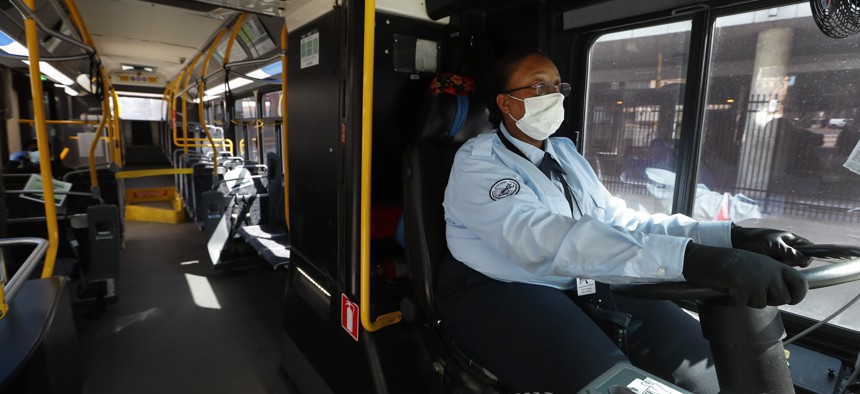Transit Agencies' Challenge Is to Balance Service with Safety

Detroit bus driver JaVita Brown wears gloves and a protective mask during the COVID-19 outbreak. City buses will have free surgical masks available to riders starting Wednesday, a new precaution the city is taking. AP Photo/Paul Sancya
Connecting state and local government leaders
From distributing face masks to offering free rides, transit agencies have adopted different approaches to protecting workers and passengers. But union leaders say more needs to be done to keep workers safe.
In the nation’s capital, subway service now stops at 9 p.m. Cincinnati bus riders will have to pay fares again after officials grew concerned that free service was encouraging people to violate the state’s stay-at-home order. And in New York City, face masks are being distributed to all public transit employees.
The coronavirus outbreak is forcing tough decisions on public transit agency officials, who need to keep their employees safe while also preserving vital bus and train service for people who must get to essential jobs.
Some advocates for workers say not enough has been done to protect them. Thousands of transit workers across the country have fallen ill and dozens have died after contracting the virus. The Metropolitan Transportation Authority in New York has been the hardest hit. Forty-one transit workers have died after contracting the virus. But agencies across the country have also been affected. Three Philadelphia transit workers died this week, as did a bus driver from St. Louis.
“Our members are getting infected at a rate that is higher than the general population, because we are continuously exposed to dozens of riders at close range without adequate personal protective equipment to keep us safe,” said Amalgamated Transit Union International President John Costa in a statement this week.
The union is calling for the Federal Transit Administration to secure and distribute personal protective equipment, including N95 face masks and gloves, to transit agencies.
In a letter to congressional leadership, the union said Congress should provide $775 million for PPE, while requiring transit agencies to ensure that buses and trains aren't crammed with riders in violation of "social distancing" guidelines meant to prevent spread of the coronavirus.
Ridership on public transit has plummeted amid the outbreak, as authorities issued stay-at-home orders that resulted in many people either working from home or, as has been the case with millions in the past few weeks, losing their jobs. While public transit agencies have reduced service, they have sought to maintain core routes to provide a way for essential services workers—including doctors and grocery store clerks alike—to get to their jobs.
In and around Washington, D.C., 19 subway stations are closed and trains are running every 20 to 30 minutes with service ending each day at 9 p.m. Ridership had dropped precipitously after 9 p.m., and officials with the Washington Metropolitan Area Transit Authority said shorter service hours would allow transit workers “to spend more time with their families, all while reducing their exposure to the public.”
As agencies adjust hours and frequency to accommodate fewer riders, they have at times struggled to avoid dangerous overcrowding, said Scott Goldstein, the policy director at Transportation for America.
“There is a real need for guidance and best practices to help provide information on how agencies should operate,” Goldstein said.
After reducing runs or otherwise changing schedules, agencies need to provide transit operators with guidance on how to avoid overcrowding, Goldstein said. This could include addressing scenarios such as whether drivers should skip bus stops if they believe their vehicle cannot safely accommodate any more riders.
Several cities have opted to waive bus fares amid the coronavirus outbreak as a safety measure so riders don’t have to cluster together or near bus drivers to pay fares when they board.
Cincinnati’s Metro suspended fare collection for bus riders at the end of March. But Mayor John Cranley said the transit agency will begin charging fares again this week after concerns were raised that people were using free bus service to get to parties and other large gatherings despite Ohio’s stay-at-home order.
“It’s clear many people took advantage of free buses to come downtown and gather illegally in violation of state law,” he said at a news conference this week.
To protect transit workers and riders, some agencies have taken to distributing face masks and other personal protective equipment.
“Agencies have been figuring this out ad hoc,” Goldstein said. “Some are providing masks and gloves, some are providing shields for the operators.”
In Detroit, where a bus driver died two weeks after posting a video on Facebook in which he criticized a passenger for not covering his mouth while coughing, the department of transportation this week began distributing masks for passengers.
The Centers for Disease Control and Prevention issued guidance this week on best practices that bus drivers, train conductors and station workers should take to protect themselves.
While the guidance suggests limiting drivers’ contact with passengers by keeping them at least six feet from the driver and having them enter and exit through the rear door of the bus, it offers no suggestions on whether or not transit workers should wear face masks.
In New York, MTA President Patrick Foye defended his agency’s response to the pandemic, saying the transit agency initially resisted calls to dole out face masks because neither the World Health Organization or CDC recommended it. Since the MTA reversed its decision and began issuing protective gear last week, Foye said 460,000 N95 respirators and surgical masks, and 2.5 million pairs of gloves have been deployed to employees.
“We have implemented our plan and made necessary changes in real time as we deal with this unprecedented public health crisis,” he said.

NEXT STORY: More free, discounted tech for governments responding to COVID-19


